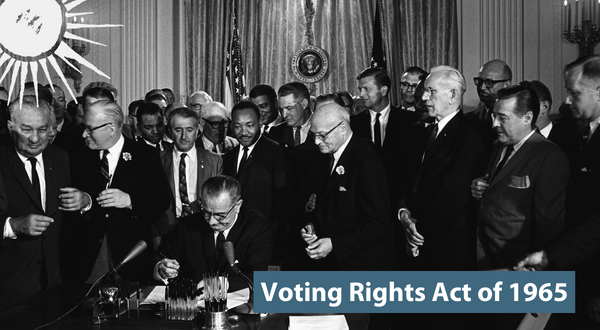
Restoring the Promise of the Voting Rights Act — 57 Years Later
Fifty-seven years ago, the Voting Rights Act of 1965 was signed into law by President Lyndon B. Johnson, a son of the South who recognized the grave wrong of denying African-Americans their right to vote. For the first time in U.S. history, Black Americans had the legal means to ensure compliance with the 15th Amendment of the Constitution and to challenge restrictive voting laws and practices designed to deny them access to the ballot. This was a victory brutally fought for in the Civil Rights Movement and a long time coming.
African Americans were hopeful that at last they could assume their place as full citizens of this country, participate equally in the political process, and exercise their right to vote without fear or harassment. But celebration was short-lived as the Voting Rights Act was met with almost immediate court challenges, mostly from Southern states, the same states where slavery had once thrived. Many people remained determined to deny the most basic right of citizenship to a large swath of their fellow citizens.
Sadly, this ‘tug of war’ for the full rights of citizenship for people of color has continued over time. In 1970, 1975, and 1982, Congress renewed the Voting Rights Act. In 2007, Congress amended it to include non-English speaking U.S. citizens, Indigenous people, and other excluded populations, and extended its enforcement provisions for 25 years. But many states, mostly in the South, continued to place obstacles in the way of non-white citizens’ exercise of their right to vote in order to dilute Black voters’ electoral power and their potential to threaten the political status quo.
Despite these efforts, the political power of Black, Latinx, Native American, and AAPI voters across the country has grown over time. Increasingly, Black and Brown voters have diversified the ranks of elected officials, making their voices heard through the ballot box so powerfully that in 2008, we saw the election of Barack Obama, the first Black President in U.S. history. In 2021, we saw the election of the first Black and the first Jewish Senators from Georgia. While these were historic victories for our country, many white citizens found them a threat to their traditional idea of America.
Backlash against Voting Rights
A growing number of white voters now fear their historical monopoly on political power in this country will be forever eroded if Black, Latinx, Native American, and other excluded voters are able to freely exercise their constitutionally protected right to vote.
This fear was apparent when the Supreme Court, in its Shelby County v Holder decision, struck down the enforcement provisions of the Voting Rights Act in 2013. The court’s ruling found that the formula to determine which jurisdictions were subject to pre-clearance requirements was unconstitutional because it is based on an old formula and assumed there was no longer a need for such enforcement. Contrary to the Court’s assumption, immediately after the ruling was handed down, states began to pass restrictive voting laws and increase ID requirements once again.
State legislatures gerrymandered district maps and made it harder to access the voting booth by closing polling places, especially in communities of color, limiting early voting, placing restrictions on mail-in voting, and by putting people in positions who will enforce these restrictions no matter the infringement on their citizens’ rights. Since the beginning of 2021, 18 states have passed 34 restrictive voting laws, which disproportionately affect voters of color.
Reclaiming Our Right to Vote
Today, as a country, we find ourselves facing the same situation the Voting Rights Act was designed to end. Once again, Black and Brown citizens have to fight to retain the fundamental right to vote their conscience and their preference in free and fair elections.
This is not just a problem for people of color. Unfounded restrictions on lawful access to the ballot, excessive and undue requirements for citizens to exercise their right to vote, and the undergirding white supremacist ideology that fuels them, are a problem for all of us. Voting is the pillar and hallmark of a functioning democracy and when citizens are unduly prevented from the free and fair exercise of that right, it weakens our democracy. That is why everyone must step up to reject these unconstitutional attacks on the right to vote.
Now Is the Time to Act
Right now, our democracy is on the verge of collapse in the face of an unrelenting assault on our rights by people who seek only their own, unrestricted power. Everyone needs to wake up to this threat to our democracy!
The Voting Rights Act of 1965 was an important step in securing the rights of citizenship for all people. We cannot and must not let its legacy be lost. At this crucial time in our country’s history, we must come together to protect our right to vote from those who would withhold the full rights of democracy from some people based on race, ethnicity, or other arbitrary distinctions.
The Senate must join the House in passing H.R.4, the John Lewis Voting Rights Advancement Act. And it’s our time to emulate the Civil Rights advocates of the 1960s and demand the rights of democracy for all. Most importantly, we must use our political power to elect policymakers who will safeguard the right to vote for all citizens.
Our vote is our voice and right now, we have to raise our collective voice and overcome these anti-democracy forces once and for all. If we fail, we might wake up to find that we no longer live in a pluralistic, democratic society, but an autocracy enforced by the political and financial power of a small group of people who fundamentally do not believe in democracy at all. The time is now to act.







